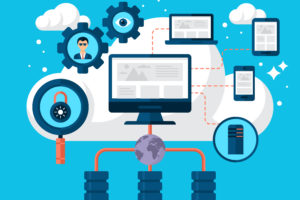If you’re trying to automate your warehouse, you’ve likely heard vendors talk about WMS and ERP. At first glance, both WMS and ERP seem very similar — both are aimed at automating, reporting, and explaining your business’s day-to-day operations.
But even though WMS and ERP are both software systems that can assist in automating your warehouse, they offer different capabilities and serve different goals.
WMS and ERP Defined
A WMS, or Warehouse Management System, is niche software that supports a warehouse’s day-to-day operations. WMS tracks the movement of stock (shipped, received), and ensures that inventory is monitored and maintained. Specifically designed for warehouses, WMS may have barcode and RFID capabilities. WMS is typically a standalone solution. You’ll need to look for other software to support accounting, sales, and customer service.
An ERP, or Enterprise Resource Planner, tracks information on a much grander scale. These all-in-one solutions take advantage of automation at every part of an organization, from sales, to inventory, to customer service, forecasts, and more. For an ERP to actually benefit an organization, all of this information must be available quickly and easily for decision makers, in one centralized hub.
The Differences
Many ERPs are focused on transactional information. While the data and information they provide can be valuable, a WMS that allows for real-time priority adjustment may make sense for your business.
ERPs offer all-in-one solutions, and that might save you money if you’re planning to scale your business operations. WMS are also scalable, and can support the growth of your warehouses — but offer limited or no cross-departmental functionality.
Finally, while both WMS and ERP rely on some outlay of capital, a robust ERP will most likely cost more than a WMS.
How to Choose
In the past, ERPs had limited warehouse management tools. Now, depending on the ERP you select, you can get most of the functionality of a standalone WMS, along with all the other tools that an ERP can offer. While choosing an ERP may seem obvious, bigger isn’t always better.
If you have a small or medium-sized business, investing in an ERP solution might not make financial sense. Unless you have operations in several different locations, a large staff, and many systems that can be automated, investing in an ERP may be overkill.
What’s more, since an ERP focuses on providing automated solutions for many different aspects of your business, it may not have the same depth of a standalone WMS solution. If your warehouse has complex operations, you may benefit more from a WMS. While an ERP offers an all-in-one solution, WMS provides a more in-depth look at exactly how your warehouse functions.
However, for smaller or medium-sized warehouses with other complex operations, an ERP’s warehouse managing capabilities may be sufficient for your business, while also providing you with support for sales, eCommerce, and other functions.
The Bottom Line
Both ERP and WMS can help businesses automate important day-to-day functions. If you have a complex, warehouse-centric business, an in-depth WMS may be the solution for you. But if your business has many moving parts, and you want to improve the information flow through all departments, an all-in-one ERP may be your best bet.
Vodigy Software is a trusted custom software provider to the St. Paul and Minneapolis area. We specialize in providing expert guidance and assistance to businesses. If you would like to make your business run more safely, contact us today!




